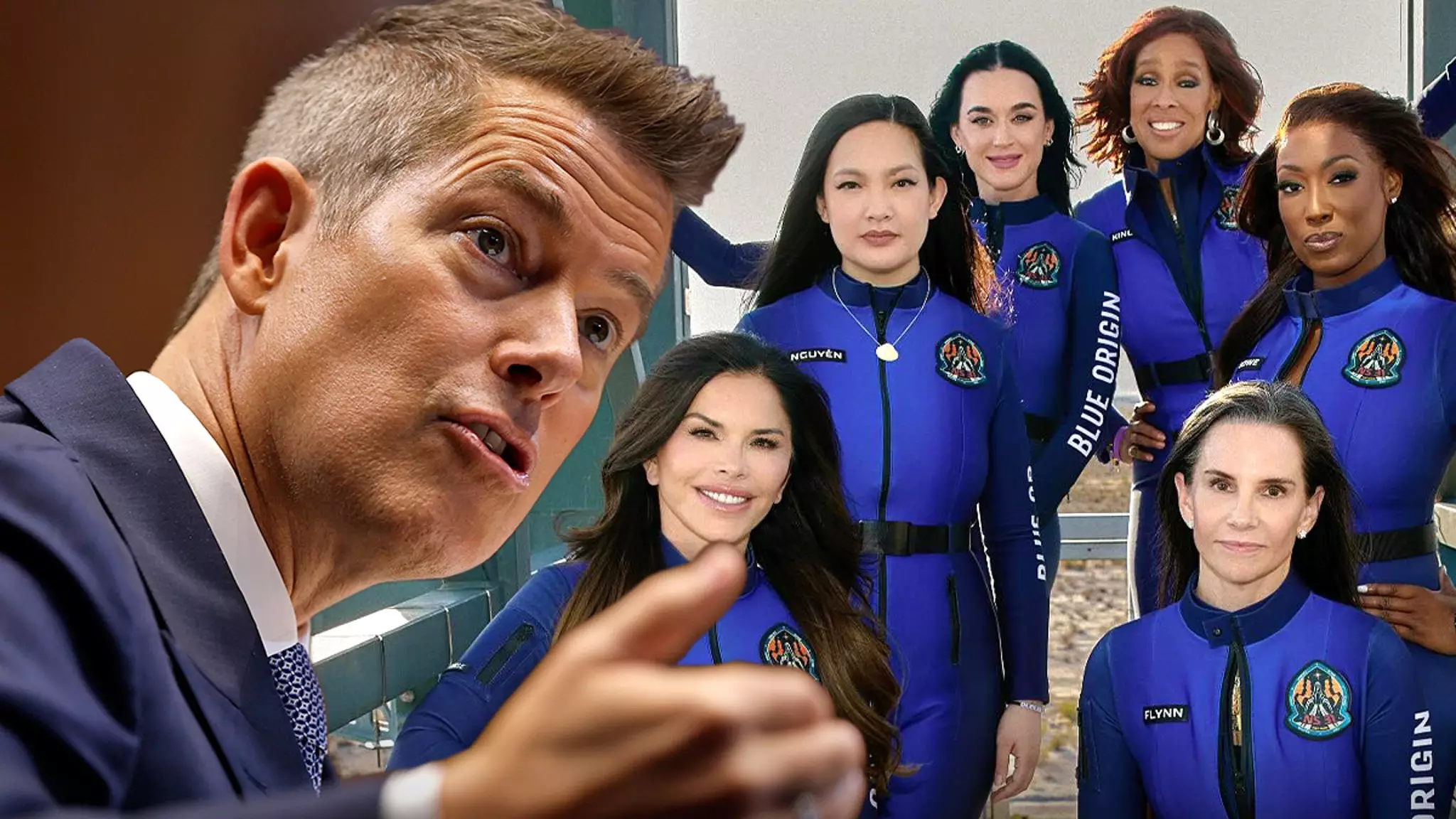In a world where the concept of exploration continuously expands, recently, a group of prominent figures—Katy Perry, Lauren Sánchez, Gayle King, Aisha Bowe, Amanda Nguyễn, and Kerianne Flynn—climbed aboard Blue Origin’s spacecraft for an exhilarating 11-minute journey to space. Their adventure, celebrated by many and framed as a breakthrough for women in space, has stirred an unexpected but necessary debate surrounding the definition of an astronaut. U.S. Transportation Secretary Sean Duffy did not hold back in expressing his critique, declaring that these women, no matter their glamour or courage, did not meet the technical qualifications established by the Federal Aviation Administration (FAA) to be considered true astronauts.
The controversy primarily revolves around the FAA’s updated guidelines, which stipulate that an astronaut must perform specific essential activities during flight, contributing either to public safety or to advancing human spaceflight safety. While the flight’s altitude soared beyond the internationally recognized boundary of space at 62 miles, Duffy’s stringent viewpoint prompts us to question how we define—and ultimately honor—those who venture into the cosmos.
Applauding the Brave or Polluting the Planet?
The broader implications of this discussion spark a more critical examination of the motivations behind such flights. Critics have labeled these excursions as frivolous, accusing wealthy space tourism ventures of engaging in environmental recklessness and self-indulgence. Celebrities like Emily Ratajkowski have openly condemned these flights, deeming them “disgusting,” reinforcing a notion that the upper echelons of society, exhibited in such high-profile space jaunts, are detached from the everyday struggles faced by the general public—especially during times of economic instability. Olivia Munn’s comments reflect a sentiment that resonates with many: while space exploration is a thrilling pursuit, why embark on costly space travel when fundamental needs like affordable food remain unaddressed?
These critiques strike a chord, igniting public discourse about priorities in a world where wealth and opportunity are disproportionately distributed. Can we afford to celebrate these so-called adventures while many are still without basic means of sustenance?
The Role of Celebrity and Technology
At the crux of this debate is the intersection of celebrity culture and technological advancement. The spectacle of high-profile figures experiencing space travel serves as an enticing promotional tool for companies like Blue Origin, undoubtedly captivating the imaginations of countless individuals. Yet, this raises a question: does the celebrity journey to space, while visually stunning, divert focus from the critical issues facing humanity?
Jessica Alba’s viewpoint, suggesting that perhaps the ire should be directed toward broader systemic issues rather than the women actually experiencing space, enriches this discussion. She hints at the need for a nuanced perspective that considers both the admirable courage of these women and the larger societal structures that facilitate vast inequities.
Further complicating this narrative, Gayle King defended her space voyage, asserting its authenticity and significance. Her statement that the experience does not detract from existing struggles emphasizes a disconnect that may serve as a catalyst for more profound conversations. Are we stuck in an outdated framework of what it means to be an astronaut—or even a human explorer in our current age?
The Pursuit of Exploration and Its Virtues
Ultimately, the conflict between the definition of an astronaut, the implications of wealth in space exploration, and societal priorities reveals an evolving landscape—a space not just for the elite but for all those willing to escape beyond our terrestrial concerns. While Duffy’s remarks echo a valid critique of the strict definitions and standards that exist, they also prompt a re-evaluation of the conversation around space travel and exploration as a whole.
In doing so, we must acknowledge that space could serve not only as a frontier ripe with opportunity but also as a platform for generating dialogue about our planet’s key issues. As technology advances and accessibility improves, perhaps the next chapter of exploration will encourage a more inclusive definition of those who take to the skies, ensuring that space isn’t just for the brave or glamorous but for the dreamers of every walk of life. This could be the avenue through which we redefine societal engagement with exploration and cultivate a sense of collective responsibility that extends far beyond the reach of the stars.

Leave a Reply